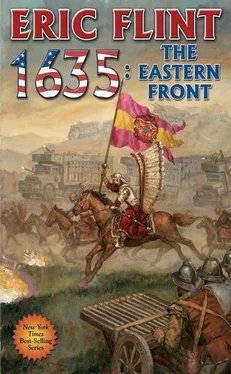Eric Flint - 1635 - The Eastern Front
Здесь есть возможность читать онлайн «Eric Flint - 1635 - The Eastern Front» весь текст электронной книги совершенно бесплатно (целиком полную версию без сокращений). В некоторых случаях можно слушать аудио, скачать через торрент в формате fb2 и присутствует краткое содержание. Жанр: Альтернативная история, на английском языке. Описание произведения, (предисловие) а так же отзывы посетителей доступны на портале библиотеки ЛибКат.
- Название:1635: The Eastern Front
- Автор:
- Жанр:
- Год:неизвестен
- ISBN:нет данных
- Рейтинг книги:5 / 5. Голосов: 1
-
Избранное:Добавить в избранное
- Отзывы:
-
Ваша оценка:
- 100
- 1
- 2
- 3
- 4
- 5
1635: The Eastern Front: краткое содержание, описание и аннотация
Предлагаем к чтению аннотацию, описание, краткое содержание или предисловие (зависит от того, что написал сам автор книги «1635: The Eastern Front»). Если вы не нашли необходимую информацию о книге — напишите в комментариях, мы постараемся отыскать её.
1635: The Eastern Front — читать онлайн бесплатно полную книгу (весь текст) целиком
Ниже представлен текст книги, разбитый по страницам. Система сохранения места последней прочитанной страницы, позволяет с удобством читать онлайн бесплатно книгу «1635: The Eastern Front», без необходимости каждый раз заново искать на чём Вы остановились. Поставьте закладку, и сможете в любой момент перейти на страницу, на которой закончили чтение.
Интервал:
Закладка:
It hadn't taken her long to start feeling another ache inside. A hollowness in her stomach, this one, not a hollowness in her heart.
She got the Hamburg newspapers and journals regularly. Also all the most important ones from Magdeburg, Hannover, Mainz, Nurnberg-Grantville, of course.
The pattern was clear in all of them, if you knew what to look for.
The Swedish chancellor fixed in Berlin, like a barnacle on a piling. Why? Berlin was a wretched place. Miserable to live in, and a political backwater.
The badly injured king kept there, jealously guarded, the great up-time Moorish doctor dismissed. Why? Once the weather cleared, Gustav Adolf could have easily been moved to the capital. Or Grantville or Jena, for that matter-wherever the medical care would be the best for his condition.
General Lennart Torstensson and the bulk of the USE army, ordered to besiege Koniecpolski in Poznan.
For God's sake, why? Amelie Elizabeth was no soldier herself, but as you'd expect from a very capable landgravine of Hesse-Kassel, she understood a great deal about military affairs. Torstensson had no chance of taking Poznan, not as badly as the war had gone so far. So why keep his army in winter siege lines which would be very hard on the troops? It would be much more sensible to retreat and winter over in Gorzow and Zielona Gora.
Only one explanation made sense. The Swedish chancellor Oxenstierna-Wilhelm Wettin, formally, but Wilhelm on his own was not this ruthless-was keeping the unreliable USE soldiery as far away as possible. And he was deliberately bleeding them.
The strategy was cunning, in a reptilian way. But didn't the chancellor understand how reckless it was? Did he really think an army would just quietly starve to death?
The USE's Third Division, under Stearns, had been sent even farther away. To southern Bohemia, if the newspaper accounts were to be believed. To do what? Help Wallenstein defend himself against the Austrians?
Again, why? The last time Austria attacked Wallenstein-just a little over two years ago, at the second battle of the White Mountain-they'd been defeated. Was it likely they would try again? Not impossible, of course, but also not at all likely. So why weaken the USE army by drawing off a third of its forces?
Then, there was the evidence she'd spent all of yesterday and half of today piecing together. This took much more time, because there was no summary to be found anywhere, in any one newspaper or journal. Just small accounts scattered across many of them-most of them, actually-of what seemed to be casual movements. This markgraf going to visit his first cousin; this freiherr off to purchase some land; this burgermeister off to do this; that reichsritter off to do that.
She didn't believe it for a minute. She knew many of these people. The markgraf in question only had three first cousins. One had drowned as a young man during his wanderjahr in a drunken stupor, one had married an Italian viscount and was living somewhere in Tuscany, and the third had been filing lawsuits against the markgraf for at least fifteen years.
The freiherr? Going off to buy land? With what? Just six months ago, he'd tried to borrow money from Hesse-Kassel. They'd refused the loan, of course. The man was notorious for not repaying his creditors.
The burgermeister? Oh, that explanation was particularly grotesque. He was supposedly-
"Ah!" Angrily, the landgravine swept all the newspapers off her desk.
And the final piece of the puzzle-and to her mind, the most damning. Why had she not received an invitation to this so-obvious conclave?
The answer was just as obvious. She called for a servant.
"Paper and ink. Then pick this up. Not now. After I'm finished with the paper and ink which you still haven't fetched for me."
The servant girl raced off. Amalie Elizabeth forced herself to calm down a bit. There was no purpose in being harsh to servants simply because they were there. Doing so just made them more impervious to discipline when it was needed.
As soon as the servant returned, she began to write.
It was almost certainly a futile exercise, but she had to make the attempt.
Wilhelm, my old and dear friend. I implore you once again-
Chapter 43
Berlin, Capital of Brandenburg
Axel Oxenstierna laid a gentle hand on Gustav Adolf's shoulder. "Be well, my old friend. You need worry about nothing. Just heal. Come back to us."
The king had seemed to be dozing. Thankfully. He'd had one of his sudden furies two hours early. They came for no reason, they left for no reason, and left everyone exhausted, including the king himself.
Gustav Adolf's eyes opened suddenly. For a moment, there seemed to be recognition there.
But if it had been there, it passed. He just seemed puzzled now. His eyes drifted away from Oxenstierna and came to rest on his bodyguard. That was Erling Ljungberg, who had replaced Anders Jonsson. For a moment, again, there seemed to be recognition in the king's eyes.
It would not be surprising. Ljungberg's facial features did not resemble those of Jonsson's very closely, but otherwise they were much alike. Both very big men, both blond, both utterly ferocious in battle. They even shared the same love of American pistols. In fact, the pistol holstered at Ljungberg's waist was the very one that had been in Jonsson's hand when he died.
If Gustav Adolf did recognize him, though, it would be hard to know for sure. His speech was still…?very odd. Axel would have thought he was outright mad, except for what the Moor had explained. This might still pass away, if all went well.
"Birches? Is that folded?" the king asked. "Just move the sand under the hymns."
Axel stroked his hair. "Rest, king. Rest."
He turned away, headed for the door. It was time to attend to the king's business.
"Make sure he comes to no harm," he said to Ljungberg, then had to restrain a little laugh when he saw the man's disgusted look. Giving such instructions to such a bodyguard was quite pointless, after all. You might as well instruct the sea to be wet.
One of the palace's servants was quick to open the door. Very quick. It had not taken Sweden's chancellor long at all to make clear to the servants of Brandenburg-the servants of former Brandenburg-that if they wished to keep their sinecures they'd have to understand that the old sleepy ways of Berlin were coming to an end. Soon enough, this would be the new capital city of the United States of Europe.
As he walked down the corridor to the very large chamber that had served the electors of Brandenburg for a reception room, Axel mused on his long relationship with Gustav Adolf. His father had died when he was sixteen-too young to rule by Swedish law and custom. At the same time, his capabilities were obvious and no one wanted a long regency with all of its attendant problems.
Axel himself had been only twenty-eight at the time. But he was a scion of one of the great noble families and already very influential. He had been the principal engineer of the arrangement that had enabled Gustav Adolf to come to the throne on January 4, 1612. He'd been only seventeen years old at the time.
Part of the arrangement had required the young king to sign a charter of guarantees that restored most of the rights and privileges of the nobility that previous Vasa rulers had stripped away from them.
Twenty-three years had gone by since then; almost twenty-four. For most of those years, Gustav Adolf had scrupulously abided by the charter of guarantees. In letter, at least. Inevitably, a monarch as capable and forceful as he would overshadow any nobility. But no one could reasonably ask for more. A weak and incapable monarch was far worse.
Then the Americans had come through the Ring of Fire. Within a year, their alliance with Gustav Adolf had begun to take shape. It had first crystallized in the formation of the Confederated Principalities of Europe, in the fall of 1632. A year later, under the impact of the war launched by the League of Ostend, the CPE's ramshackle structure had been swept away and replaced with the much more powerful United States of Europe-a true federation, now, with real national power.
Читать дальшеИнтервал:
Закладка:
Похожие книги на «1635: The Eastern Front»
Представляем Вашему вниманию похожие книги на «1635: The Eastern Front» списком для выбора. Мы отобрали схожую по названию и смыслу литературу в надежде предоставить читателям больше вариантов отыскать новые, интересные, ещё непрочитанные произведения.
Обсуждение, отзывы о книге «1635: The Eastern Front» и просто собственные мнения читателей. Оставьте ваши комментарии, напишите, что Вы думаете о произведении, его смысле или главных героях. Укажите что конкретно понравилось, а что нет, и почему Вы так считаете.












